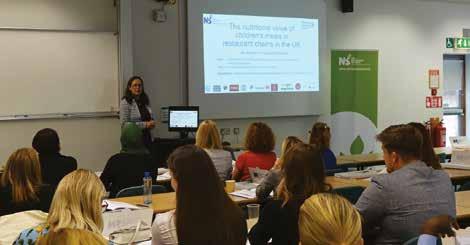
2 minute read
2017 Summer Studentship: Michelle Young
University of Roehampton
Dr Sue Reeves (Supervisor)
Each year, The Nutrition Society offers a number of Summer Studentships to undergraduate members interested in a career in nutritional science. The Studentships provide students with the opportunity to undertake a period of research in a university, research institute or industrial setting over the summer months. All winners are supported by an academic supervisor. Michelle Young, University of Roehampton, supported by Dr Sue Reeves, was one of the 2017 Summer Studentship winners. Michelle’s project entitled ‘The nutritional value of children’s meals in restaurant chains in the UK’ analysed the nutritional content of children’s menus at full service and fast food restaurants in 22 restaurants across the UK. We asked Michelle why she applied for the research grant and what she learned from the experience.

What inspired you to apply for the Nutrition Society Summer Studentship?
This project was driven by experience of eating out with my son. In general, I have been unimpressed by the poor choice of vegetables available on children’s menus, and the large portion sizes. The poor choice inspired me to carry out a rigorous investigation into the nutrient content of children’s meals. I was aware of the Society Studentship but understood that it focused on laboratory based research projects until my supervisor, Dr Sue Reeves, approached me and suggested I apply. My undergraduate study has instigated a career change so I am keen to get as much practical experience as possible. This project provided an ideal platform for me to gain relevant experience over the summer.
Were there any challenges you had to overcome during the project?
I was over-optimistic about how smoothly the project would run, particularly the timeframes. Some phases of the project took longer than expected, especially the data analysis. Throughout the project I needed to manage large data sets to create the meal combinations. I expected this to be the most challenging aspect of the project, but once I worked out the methodology, I could replicate this across the data.
Prior to starting the project, I thought I would relish working independently on a large project, however I missed discussing aspects of my work and sharing ideas with fellow students. That was a surprise for me and taught me a lot about the value of collaboration, and also about how I prefer to work.
What did this project teach you about research and being a researcher?
Writing the final report really forced me to condense my writing style and be precise. It was arduous, but an excellent opportunity to learn how to edit my own work. Collecting the data and creating the dataset were tasks I could complete independently, however for the data analysis I really benefitted from my supervisor’s input and her suggestions on the direction of the analysis.
You presented your study at the Society’s student conference, was this a valuable experience?
I enjoyed presenting at the Student Conference and sharing my findings. The other students seemed interested in my study and asked questions which was rewarding. It was also interesting to learn which aspects of the study others pick up on, as these differed to what I thought the most important findings were.
How do you feel this opportunity will enhance your study and future career?
I have learned a lot from this project. Writing the abstract and presenting at the Student Conference was excellent practice for learning how to be clear and concise when presenting results. I think this will serve me well both academically and professionally. The studentship reminded me that, whilst I very much enjoy research, collaboration is very valuable, and enjoyable. This project confirmed my interest in public health nutrition and highlighted how the environment can influence positive food choices. I am definitely spurred on to try to make a difference in this area.



